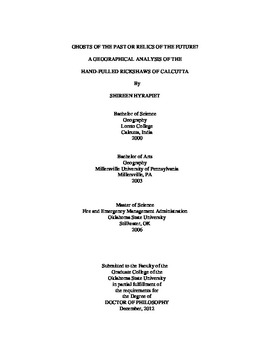| dc.contributor.advisor | Greiner, Alyson | |
| dc.contributor.author | Hyrapiet, Shireen | |
| dc.date.accessioned | 2014-09-24T14:16:22Z | |
| dc.date.available | 2014-09-24T14:16:22Z | |
| dc.date.issued | 2012-12 | |
| dc.identifier.uri | https://hdl.handle.net/11244/19493 | |
| dc.description.abstract | This dissertation was an attempt to develop a better understanding of the use and value of hand-pulled rickshaws in the city of Calcutta and the lifeworlds of the rickshaw pullers because of a ban placed on the profession in 2006. Using an ethnographic approach, 83 semi-structured interviews were gathered with rickshaw pullers, owners, the public, and government officials. Content and discourse analysis were used to analyze the data and present the findings in a three-article dissertation format. Each article is a stand-alone piece of work modeled along different yet interrelated geographical conceptual frameworks. This study has shown that through long-standing relationships of trust, familiarity, and dependability, residents and rickshaw pullers fulfill critical daily needs in each other's lives which makes a place for rickshaw pullers in Calcutta. Through a consideration of the geographical imagination, the analysis has also provided insights about the relationship between local perceptions, planning, and city image change while simultaneously showing that popular discourses construct and represent the rickshaw pullers as people whose status is characterized by ambiguity and betweenness. This research has shown that the pullers have been able to negotiate and maintain their right and access to their livelihood by engaging in active and passive forms of resistance, and because of the role played by multiple actors involved with the rickshaw ban. Overall, this study concludes that urban development affords significant biases which must be evaluated to ensure social justice. Additionally, this evaluation is critical because urban development is embedded with power relations as dominant groups attempt to regulate who belongs where and what is appropriate and inappropriate in place, while traditionally weaker groups manipulate power for their own survival and existence. This investigation is valuable to planners and policy makers since it provides an understanding of the use and value of the profession to the city and the contributions of the rickshaw pullers to the lives of residents. On a broader scale, this research has used different lenses to provide insights about an informal profession and suggests a need to evaluate the contributions of similar professions in other parts of the world. | |
| dc.format | application/pdf | |
| dc.language | en_US | |
| dc.rights | Copyright is held by the author who has granted the Oklahoma State University Library the non-exclusive right to share this material in its institutional repository. Contact Digital Library Services at lib-dls@okstate.edu or 405-744-9161 for the permission policy on the use, reproduction or distribution of this material. | |
| dc.title | Ghosts of the past or relics of the future? A geographical analysis of the hand-pulled rickshaws of Calcutta | |
| dc.contributor.committeeMember | Vadjunec, Jacqueline | |
| dc.contributor.committeeMember | Sheehan, Rebecca | |
| dc.contributor.committeeMember | Dunlap, Riley | |
| osu.filename | Hyrapiet_okstate_0664D_12431.pdf | |
| osu.accesstype | Open Access | |
| dc.type.genre | Dissertation | |
| dc.type.material | Text | |
| dc.subject.keywords | calcutta | |
| dc.subject.keywords | development | |
| dc.subject.keywords | informal economy | |
| dc.subject.keywords | politics | |
| dc.subject.keywords | rickshaw | |
| dc.subject.keywords | social justice | |
| thesis.degree.discipline | Geography | |
| thesis.degree.grantor | Oklahoma State University | |
